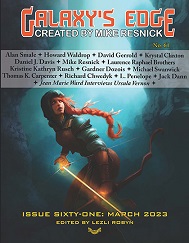 Galaxy’s Edge #61, March/April 2023
Galaxy’s Edge #61, March/April 2023
“Down and Out in the Church of the Tortured Goose” by Thomas K. Carpenter
“Afternoon at Schrafft’s” by Gardner Dozois, Jack Dann, and Michael Swanwick (reprint, not reviewed)
“Antares Needs Actors” by Daniel J. Davis
“Sing” by Kristine Kathryn Rusch (reprint, not reviewed)
“Ship of the Gods” by Laurence Raphael Brothers
“The Godstone of Venus” by Mike Resnick (reprint, not reviewed)
“Fossil Fuels” by Alan Smale (reprint, not reviewed)
“Flight of the Silverbird” by Krystal Claxton
“Night of the Cooters” by Howard Waldrop (reprint, not reviewed)
“Death Game” by David Gerrold
Reviewed by Victoria Silverwolf
The penultimate on-line issue of the magazine, before it evolves into a printed biannual anthology, offers five new works of fiction, including a novelette from a veteran, award-winning author.
“Down and Out in the Church of the Tortured Goose” by Thomas K. Carpenter features a young woman who is forced to steal data from computerized houses by her abusive mother. At the same time, a bioengineered rabbit, controlled by an artificial intelligence in the form of a religious cult, does the same thing. The two unhappy, reluctant thieves eventually come together in the face of overwhelming odds.
This unusual and imaginative story has the content of cyberpunk fiction but the mood of a fairy tale. The reader is sure to sympathize with the two long-suffering protagonists, even if the technological speculation is not always plausible.
One curious aspect of the narrative is the fact that the mother is named Morticia Jones. This appears to be an allusion to a famous fictional character and the actress who portrayed her on television. Even if intended ironically, this reference carries inappropriate connotations, given the mother’s personality.
In “Antares Needs Actors” by Daniel J. Davis, a stunt man who thinks he is just taking on a role in a movie is teleported to another world, where he faces gigantic monsters and the beautiful ruler of the planet. Swordplay, a dying civilization, and romance follow.
This tongue-in-cheek work is obviously a loving tribute to old-fashioned sword-and-planet yarns. (If any other hint is needed, the back story involves a character named Edmund Hamilton, although the fictional version does not resemble the pioneer author of space opera adventures at all.) Nostalgic science fiction fans may get a kick out of it, while others may find it too silly.
“Ship of the Gods” by Laurence Raphael Brothers is a brief account of a meeting between Thor and Loki in the modern world, during which their ancient enmity takes on a new meaning. This tiny piece is more of an anecdote than a fully developed story, best enjoyed for its portrayal of the two deities reacting to fictionalized versions of themselves in movies.
The narrator of “Flight of the Silverbird” by Krystal Claxton leaves a loved one behind in order to become a disembodied consciousness in a vessel journeying beyond the edge of the observable universe. The intent is to conquer death and entropy.
I have probably badly explained the premise, as this is really a prose poem and not a traditional work of narrative fiction. The language is often more beautiful than illuminating. The phrase “dark with every photon of light,” for example, is evocative but hardly intelligible. Readers more interested in style than content will best appreciate this enigmatic work.
In “Death Game” by David Gerrold, a married couple participate in a macabre reality show. Out of a group of contestants, one person is given a poison capsule at random, while the others receive harmless ones. As the game continues, the money awarded to the survivors grows as the chance of dying increases. The choice between quitting with a modest reward or taking a greater risk in order to win a fortune leads to tension between the two spouses.
The narrator is never named or described in any way, although his or her husband is called Jack and comes across as a more completely realized character. This may be deliberate on the author’s part, in order to allow the reader to empathize with the anonymous narrator.
The premise of a deadly television game show is hardly a new one, going back at least as far as Robert Sheckley’s 1958 story “The Prize of Peril.” The present work is less satiric than others of its kind, and appears to be more interested in examining addiction to risk-taking as well as love and marriage. Although not entirely original, readers are likely to find it a thoughtful meditation on important themes.
Victoria Silverwolf thinks of Morticia Addams as a role model.